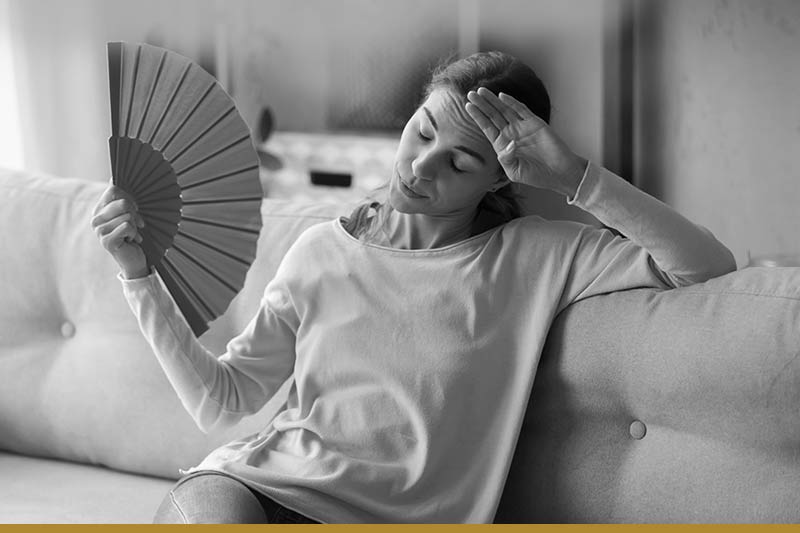Hormones affect a variety of bodily mechanisms. One of them is temperature-regulation. When the complex interaction of hormones is disrupted, patients can experience abnormal heat production or heat loss.
Sweating (perspiration) is how the body cools down and controls internal body temperature. However, an unusual shift in hormone levels can increase body temperature and stimulate sweating independent of circumstances such as the external environment or physical activity.
This article explains the symptoms and the causes of hormonal sweating and provides information on how to treat this unpleasant condition.

Hormonal sweating is the result of hormonal imbalances in the body. Chemical changes on a hormonal level directly affect the hypothalamus - an area in the brain responsible for thermoregulation. The hypothalamus activates the temperature-modulation response of blood vessels, the skin, and sweat glands.
If you are experiencing excessive sweating, hot flashes, or night sweats, it may be caused by imbalances in different hormones, including estrogen, progesterone, testosterone, and thyroid hormones. This is especially true during menopause, perimenopause, or pregnancy. Also, hormonal sweating is often a symptom of thyroid-related conditions, low testosterone levels, premenstrual dysphoric disorder (PMDD), and premenstrual syndrome (PMS).
Unstable hormone activity changes the body’s temperature, activating the sweat glands and triggering these symptoms:
There are a number of hormone-related conditions that can result in elevated body temperature and sweat, and both men and women can be affected.
Here are the conditions that most commonly cause these unpleasant symptoms:
During perimenopause, the transitional phase preceding menopause, women undergo many physiological and psychological changes. Besides irregular periods, mood swings, and disrupted sleep, hot flashes are one of the hallmarks of this turbulent life phase.
Estrogen levels start to decline during perimenopause. This sudden drop in estrogen makes the hypothalamus, the brain’s body heat control center, more sensitive to temperature changes. In the mistaken belief the body is getting too hot, the hypothalamus sends messages to the body to cool down. This results in hot flashes, night sweats and profuse sweating.
Body temperature rises during pregnancy in response to multiple physiological changes. Progesterone, the hormone responsible for creating a perfect environment for the embryo, also has an effect on thermoregulation.
Maternal core temperature peaks in the first trimester due to elevated progesterone and the higher metabolic rate needed to sustain a healthy pregnancy. The body generates extra heat and increases blood flow to the skin, causing hot flashes. Sweating is the healthy response of the body to lower temperature to protect the mother and fetus from overheating.
Feeling thirsty, shaky, and sweaty during pregnancy can indicate gestational diabetes, a reversible condition caused by insulin resistance that can develop during pregnancy. Your doctor will monitor your blood sugar levels to rule out this possibility.
Note: Learn how are insulin resistance and weight loss related and how can a change in your lifestyle reverse this condition.
Postpartum begins with the delivery of the placenta. It represents the post-delivery period that is marked by a sudden dip in estrogen levels. This hormonal shift affects the hypothalamus, making women more sensitive to temperature changes and more prone to sweating. Moreover, breastfeeding decreases estrogen due to elevated levels of prolactin, the hormone responsible for milk-production.
As a result of this estrogen deficiency, post-baby night sweats continue for a prolonged period. However, sweating postpartum helps the body to get rid of the extra fluid accumulated during pregnancy. In this sense, it can help women lose some of the weight gained during gestation.
Hot flashes and night sweats are common symptoms of premenstrual syndrome (PMS) or premenstrual dysphoric disorder (PMDD), a more severe case of PMS. Estrogen and progesterone have a complex interplay in the reproductive cycle which can sometimes lead to increased sweating in the days before menstruation occurs.
Progesterone rises during ovulation and stays elevated in the second part of the cycle, the luteal phase. This hormone triggers a rise in basal body temperature (the lowest body temperature at rest). At the same time, estrogen decreases after ovulation and stays low during the luteal phase, making the hypothalamus more sensitive to temperature changes. As core body temperature rises, this increased sensitivity produces abundant sweating.
Hyperthyroidism (an overactive thyroid) is an endocrine health condition with numerous physical symptoms, including heat intolerance and sweating.
The thyroid gland regulates body temperature and controls the metabolic rate, or how the body uses energy. An overactive thyroid gland speeds up metabolism, causing weight loss, rapid heartbeat, and increased sensitivity to heat. Thus, sweating occurs more frequently and is more profuse.
Note: Some of the symptoms of hyperthyroidism, such as rapid heartbeat and weight loss, overlap with the symptoms of iron-deficiency anemia. Read our blog to learn more about weight loss caused by anemia.
Low testosterone in men, also known as male hypogonadism, produces a variety of symptoms, such as low energy, decreased sex drive, hot flashes and heavy sweating at night.
As they age, men undergo gradual hormonal changes, sometimes called the andropause or male menopause. Testosterone levels slowly decline, affecting the hypothalamus, the temperature-regulatory center in the brain.
Testosterone therapy is an effective solution for this hormonal imbalance. It restores adequate amounts of testosterone and reverses the uncomfortable symptoms, such as profuse sweating.
Note: Check out our article and find out how does testosterone increase sex drive.
Hormonal sweating can interfere with your daily activities, especially if you live in a hot and humid climate. These tips can help you minimize the unpleasant effects of profuse sweating:
Nutritional supplements that balance hormones can help against excessive sweating (hyperhidrosis). Notably, vitamin E can decrease the frequency of hot flashes in menopause and reduce the night sweats. Heavy sweating can easily lead to magnesium deficiency and mineral supplements can prevent this from happening.
Note: Osmosis MD Hormone Relief Elixir is a natural hormone balancing supplement that can reduce unpleasant hormonal symptoms, such as hot flashes.

Hormonal sweating could be a warning sign of a much deeper health condition triggered by a hormonal imbalance. If you are at an age when hormone levels start to shift, consult a medical expert in the field and schedule a physical examination. They will tell you about treatments that can restore optimal levels of estrogen, progesterone, and testosterone, such as bioidentical hormone replacement therapy.
Note: Check out the cost of Female Bioidentical HRT offered by Vibrant Vitality Clinic.
Start wearing lightweight, breathable clothing made of natural fibers, such as cotton, linen, or silk. Rather than one thick top, go for layers so that you can take clothes off as you start to feel hot.
Invest in eco-friendly clothes to allow your skin to breathe and wick away excess moisture. Some clothing brands have specialized in blends of natural and synthetic fabrics that do just this. Avoid wearing 100% synthetic fabrics such as nylon and polyester because they prevent the skin from breathing and also trap moisture.
Hydrate more frequently to replenish the water lost due to heavy sweating. Avoid spicy food and alcohol, which stimulate thermogenesis, or the production of body heat. Caffeinated drinks, soda, and even chocolate can also increase sweating.
This is especially valid for your bedroom. A cooler room will not only help manage hot flashes and night sweats, scientists have found that lower temperatures are conducive to a good night’s rest as melatonin production is increased at temperatures between 60 and 68 degrees.

Consult your health provider if the problem persists or if you notice additional hormone-related issues. Establishing the root cause of sweating is an essential first step in treating this condition properly.
Feeling faint, dehydration, or a high fever require immediate medical attention.
Keep your hormone levels in check with prompt, preventive action to reduce hot flashes, night sweats and abnormal sweating. Discovering the primary cause of hormonal sweating will help you get appropriate treatment.
If you suspect profuse sweating is caused by hormones, feel free to consult our team at Vibrant Vitality Clinic. Our medically trained experts will help you eliminate this uncomfortable symptom of hormonal imbalance.




4325 E Indian School Rd, Suite 130
Phoenix, AZ 85018
United States
(480) 422-2058
info@vibrantvitalityclinic.com
Monday - Friday: 9:00 am - 6:00 pm
Saturday: 9:00 am - 3:00 pm
Sunday: Closed
